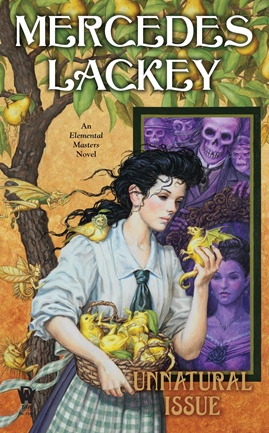Description
The sixth novel in Mercedes Lackey's magical Elemental Masters series reimagines the fairy tale Donkeyskin in a richly-detailed alternate Victorian England
Susanne Whitestone, an Earth Master magician, had always lived in Whitestone Manor and liked nothing more than to keep the land itself and its animal inhabitants thriving. For the last eleven years, she has had a special teacher in the forest—a powerful fae known only as Robin. Susanne, at twenty-one, doubted any mortal Earth Master could find fault with the practices that Robin taught her.
But though Susanne was her father’s only child, she had never set eyes on him, for Richard Whitestone lived as a recluse in a sectioned off wing of the manor. Richard Whitestone was also an Earth Master, but since his beloved wife’s death in childbirth, he had lived a kind of half-life. He hated even the thought of the child who had ended his wife’s life. His own life had withered, and as he had grown bitter, and blighted, so had everything he could see from his windows—the once-beautiful private garden was now as stark and wizened as his heart.
But as the years passed, Richard found that there was one thing that gave him solace—the thought, an obsession, that he could bring his Rebecca back to life through necromancy. He would need an appropriate vessel for her spirit, a young woman, preferably one who looked like she did and was approximately the same age that Rebecca has been at the time of her death—twenty-one....and Susanne was the image of her mother.
About the Author
Mercedes entered this world on June 24, 1950, in Chicago, had a normal childhood and graduated from Purdue University in 1972. During the late 70's she worked as an artist's model and then went into the computer programming field, ending up with American Airlines in Tulsa, Oklahoma. In addition to her fantasy writing, she has written lyrics for and recorded nearly fifty songs for Firebird Arts & Music, a small recording company specializing in science fiction folk music."I'm a storyteller; that's what I see as 'my job'. My stories come out of my characters; how those characters would react to the given situation. Maybe that's why I get letters from readers as young as thirteen and as old as sixty-odd. One of the reasons I write song lyrics is because I see songs as a kind of 'story pill' -- they reduce a story to the barest essentials or encapsulate a particular crucial moment in time. I frequently will write a lyric when I am attempting to get to the heart of a crucial scene; I find that when I have done so, the scene has become absolutely clear in my mind, and I can write exactly what I wanted to say. Another reason is because of the kind of novels I am writing: that is, fantasy, set in an other-world semi-medieval atmosphere. Music is very important to medieval peoples; bards are the chief newsbringers. When I write the 'folk music' of these peoples, I am enriching my whole world, whether I actually use the song in the text or not."I began writing out of boredom; I continue out of addiction. I can't 'not' write, and as a result I have no social life! I began writing fantasy because I love it, but I try to construct my fantasy worlds with all the care of a 'high-tech' science fiction writer. I apply the principle of TANSTAAFL ['There ain't no such thing as free lunch', credited to Robert Heinlein) to magic, for instance; in my worlds, magic is paid for, and the cost to the magician is frequently a high one. I try to keep my world as solid and real as possible; people deal with stubborn pumps, bugs in the porridge, and love-lives that refuse to become untangled, right along with invading armies and evil magicians. And I try to make all of my characters, even the 'evil magicians,' something more than flat stereotypes. Even evil magicians get up in the night and look for cookies, sometimes."I suppose that in everything I write I try to expound the creed I gave my character Diana Tregarde inBurning Water:"There's no such thing as 'one, true way'; the only answers worth having are the ones you find for yourself; leave the world better than you found it. Love, freedom, and the chance to do some good -- they're the things worth living and dying for, and if you aren't willing to die for the things worth living for, you might as well turn in your membership in the human race."Also writes asMisty LackeyAuthor's website
